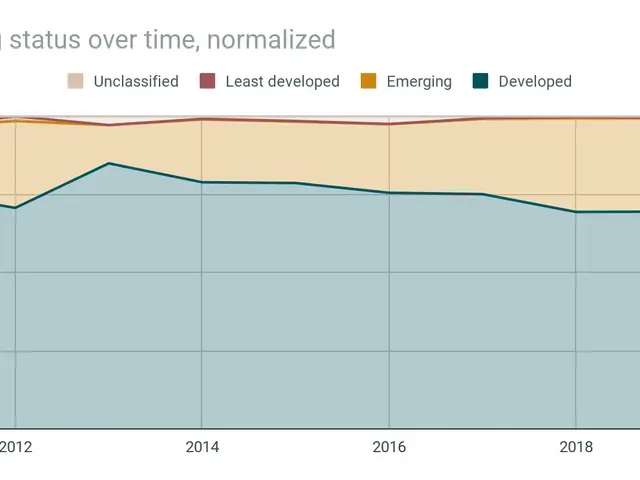Wartime Ukraine demonstrates innovative approaches to economic endurance
In the face of significant challenges, Ukraine's economy continues to show resilience, demonstrating institutional capacity and entrepreneurial adaptability that bode well for long-term recovery prospects.
According to recent projections, inflation is expected to peak at 13.2% this year before moderating to 7.1% in 2026. This trend is coupled with a projected economic growth of 2.5% in 2025 and 2% in 2026. However, these figures are overshadowed by the looming threats to Ukraine's economy, particularly the ongoing conflict with Russia.
Approximately one-fifth of Ukraine's territory remains under Russian occupation, displacing millions of citizens and exacerbating demographic challenges. The deteriorating security situation, potential waning of Western support, and permanent emigration of refugees pose significant risks for Ukraine's economy.
Despite these challenges, Ukraine's IT sector has shown remarkable growth, with exports increasing by 8% in 2023, accounting for nearly 4% of GDP. This sector, along with other areas of entrepreneurial activity, has helped Ukraine maintain its economic momentum.
Corruption remains a concern for potential investors, but Ukraine has made significant progress in this area, according to a companion OECD Integrity and Anti-Corruption Review. The report notes that Ukraine has demonstrated a strong commitment to public and business integrity, with many elements of its anti-corruption framework now measuring up to those of OECD countries.
However, Ukraine's public debt is projected to reach 116% of GDP by 2026, a concerning figure that is partly attributed to the high defence spending, which consumes 25% of GDP. This high defence spending pushes the budget deficit to approximately 20% of GDP.
To address these challenges, the OECD has recommended a reform agenda for Ukraine. This includes simplifying regulatory frameworks, promoting competition, improving access to finance, and strengthening corporate governance. Tax administration reform through greater digitalisation could expand the revenue base while reducing compliance burdens that push businesses into the informal economy.
One of the significant constraints on growth in Ukraine is severe labour shortages, particularly in historically male-dominated sectors like construction and transportation. The OECD advises reducing restrictions on female employment, such as those barring women with young children from shift work, to boost labour participation.
International partners, including Germany and the United States, are providing significant economic support to Ukraine in the face of the brutal Russian attack. Germany provides extensive aid through military support, infrastructure repair funded by the KfW development bank, and humanitarian assistance in cooperation with international organizations. The US is also a major bilateral military supporter alongside Germany.
As Ukraine looks towards post-war recovery, economic managers are focusing on positioning the country for reconstruction. With an estimated reconstruction cost of over 400 billion US dollars, foreign direct investment will play a crucial role in rebuilding the country. However, foreign direct investment has plummeted by over 70% since 2021.
Critical infrastructure faces regular bombardment, adding to the economic strain. The OECD highlights this as a significant concern, emphasising the need for investment in infrastructure repair and modernisation.
In conclusion, while Ukraine faces significant challenges, its economic resilience and the support of international partners offer hope for a brighter future. The implementation of the OECD's recommendations could help position Ukraine for sustainable growth and recovery in the post-war era.
Read also:
- Peptide YY (PYY): Exploring its Role in Appetite Suppression, Intestinal Health, and Cognitive Links
- Toddler Health: Rotavirus Signs, Origins, and Potential Complications
- Digestive issues and heart discomfort: Root causes and associated health conditions
- House Infernos: Deadly Hazards Surpassing the Flames








